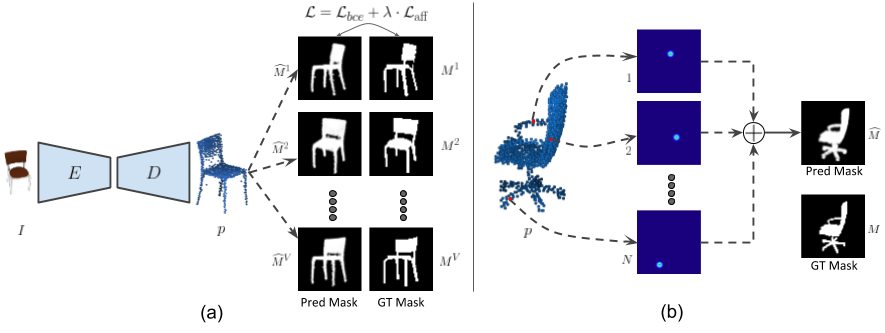Source codes for the paper CAPNet: Continuous Approximation Projection For 3D Point Cloud Reconstruction Using 2D Supervision.
Accepted at Thirty-Third AAAI Conference on Artificial Intelligence (AAAI-19)
CAPNet proposes a 2D supervised approach for single image based 3D point cloud reconstruction. To obtain smooth projections from the reconstructed point and to enable end-to-end training of the network, we propose a novel differentiable rendering module termed CAPNet. Additionally, for effective backpropogation of gradients and to avoid outliers in our predictions, we introduce a loss term called affinity loss. We experimentally demostrate that through the use of just 2D mask supervision from multiple view points, it is possible to obtain reconstruction performance close to that of 3D supervised approaches.
We use the ShapeNet dataset in our experiments. Ground truth point clouds and training and validation splits are provided below:
ShapeNet pointclouds (~2.8 GB): https://drive.google.com/open?id=1cfoe521iTgcB_7-g_98GYAqO553W8Y0g
ShapeNet train/val split: https://drive.google.com/open?id=10FR-2Lbn55POB1y47MJ12euvobi6mgtc
We use the code provided by Tulsiani et al. to obtain the rendered images.
Download each of the folders, extract them and move them into data/. Save the rendered images in data/ShapeNet_rendered/
The folder structure should be as follows:
--data/
--ShapeNet_rendered/
--ShapeNet_pcl/
--splits/
Install TensorFlow. We recommend installing version 1.3 so that the additional TensorFlow ops can be compiled.
Clone the repository:
git clone https://github.com/val-iisc/capnet.git
cd capnetTo train the model, run
bash run_train.shFor visualization and metric calculation, run
bash run_metrics.shMake sure that the trained model exists before running the metric calculation code. Use the option --visualize in place of --tqdm to visualize the reconstructed 3D point clouds.
- Provide pre-trained models
- Add code for test-stage optimization
- Add dataset and codes for training and evaluation on Pix3D dataset
If you make use of the code, please cite the following work:
@inproceedings{kl2019capnet,
author = {Navaneet, K L and Mandikal, Priyanka and Agarwal, Mayank and Babu, R Venkatesh},
booktitle = {Thirty-Third AAAI Conference on Artificial Intelligence{(AAAI-19)}},
title = {{CAPNet}: Continuous Approximation Projection For 3D Point Cloud Reconstruction Using 2D Supervision},
year = {2019}
}
